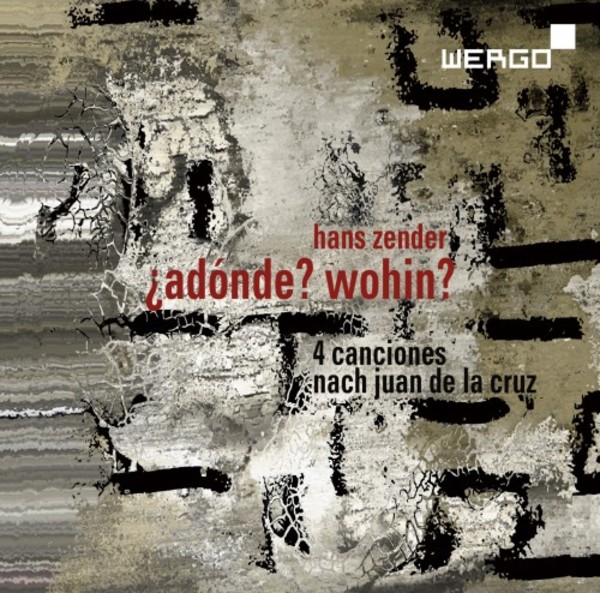
Hans Zender - Adonde-Wohin: 4 Canciones based on Juan de la Cruz
£13.25
Usually available for despatch within 2-3 working days
Despatch Information
This despatch estimate is based on information from both our own stock and the UK supplier's stock.
If ordering multiple items, we will aim to send everything together so the longest despatch estimate will apply to the complete order.
If you would rather receive certain items more quickly, please place them on a separate order.
If any unexpected delays occur, we will keep you informed of progress via email and not allow other items on the order to be held up.
If you would prefer to receive everything together regardless of any delay, please let us know via email.
Pre-orders will be despatched as close as possible to the release date.
Label: Wergo
Cat No: WER73362
Format: CD
Number of Discs: 1
Genre: Vocal/Choral
Release Date: 2nd December 2016
Contents
Works
Adonde? Wohin? for violin, soprano and instrumentsO cristalina ... for 3 groups of vocalists and instruments
Oh bosques-O Walder for soprano, choir and small orchestra
Por que? Warum? for a cappella double choir
Artists
Angelika Luz (soprano)Ernst Kovacic (violin)
Klangforum Wien
Priska Eser (soprano)
Chor des Bayerischen Rundfunks
Symphonieorchester des Bayerischen Rundfunks
SWR Vokalensemble Stuttgart
SWR Sinfonieorchester Baden-Baden und Freiburg
Conductors
Sylvain CambrelingSusanna Malkki
Marcus Creed
Emilio Pomarico
Works
Adonde? Wohin? for violin, soprano and instrumentsO cristalina ... for 3 groups of vocalists and instruments
Oh bosques-O Walder for soprano, choir and small orchestra
Por que? Warum? for a cappella double choir
Artists
Angelika Luz (soprano)Ernst Kovacic (violin)
Klangforum Wien
Priska Eser (soprano)
Chor des Bayerischen Rundfunks
Symphonieorchester des Bayerischen Rundfunks
SWR Vokalensemble Stuttgart
SWR Sinfonieorchester Baden-Baden und Freiburg
Conductors
Sylvain CambrelingSusanna Malkki
Marcus Creed
Emilio Pomarico
About
The four compositions on this CD, presented here for the first time as a cycle, are steeped in these complex and subtle harmonic ideas, rich in possibilities yet extremely fragile. The pieces, with different performing combinations, function as a cycle primarily because of the poet chosen: ‘St. John of the Cross’, a great Spanish mystic of the 16th century. His Cántico spiritual is counted among the literary high points of the Spanish Golden Age.
Zender set the first 14 of the complete 40 verses in a manner 'entirely like Mozart'; this easily fits into Zender’s sophisticated and pluralistic musical and literary view of the world, which mediates between Hölderlin and Joyce, Shakespeare and Michaux, Dada and the Bible, and which discovers closer connections between Surrealism and Zen philosophy, or Master Eckart and Master Ikkyu, 'than are dreamt of in our philosophy'.
Error on this page? Let us know here
Need more information on this product? Click here